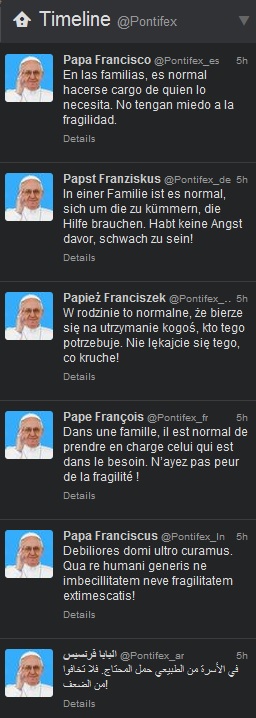 Each day there are tweets from Pope Francis’ account. They post more or less the same content in different languages. Someone is busy!
Each day there are tweets from Pope Francis’ account. They post more or less the same content in different languages. Someone is busy!
Today we have this, in Latin:
Debiliores domi ultro curamus. Qua re humani generis ne imbecillitatem neve fragilitatem extimescatis!
Pay attention to that ultro!
This is rendered in English as:
In a family it is normal to take charge of those who need help. Do not be afraid of frailty!
I think that limps. And yes, I know that the original is probably not in Latin.
His exaratis, can you do better at putting the Latin into English?
I am still not convinced that Pope’s should tweet, though clearly this is not the Pope tweeting every day. Who knows how these are produced. There must be some sort of Tweeter Tiger Team. I wonder if they have any contact with the Secret Vatican Vampire Assassins Squad.


































I know for a fact that there is a team in the Holy See Press office that is responsible for the twitter account. Fr. Tom Rosica does a lot of the English Language stuff as he is the official English Language Spokesman
Etiam infirmum cum gratia familia fere curat, noli timere infirmitatem.
Even if you take the Spanish as original, ultro doesn’t seem idiomatic Latin; that’s why I suggested cum gratia. Gratia is , of course, always in our religious context.
We’ll need to send our scholar to Latin prose composition. That term I was sent to work on the AAS.
Salutationes omnibus..
Literal: “At home, we spontaneously care for the weaker ones. Why should you fear the feeble or frail of the human race?” (Not totally sure about this, since I can’t figure out why extimescatis is subjunctive.)
Smoother: “At home, you spontaneously care for the weak. Why do you fear to care for the feeble and frail in the world?”
WesleyD:
“I can’t figure out why extimescatis is subjunctive”
Because “ne + subjenctive” is a form of imperative.
Ne dicas – don’t say! Ne audias – don’t hear. Ne timeas – don’t be afraid.
Ne timeas, Zacharia, quoniam exaudita est deprecatio tua … (Lc Cpt I)
On the fly, ad fontes…
Re linguae latinae
Syntax: awk. Put domi in first position, for sense and for balance, but I don’t love “ultro,” which is frigid.
It’s ALL wordy, too, most un-Latiniate, even as the language is incomplete: if we stop with warning the faithful off of fearing, it sounds like those outside of the home had been mistaken for Dr. Frankenstein’s monsters: how about not fearing to love or care for them????
Ne to govern the subjunctive takes, in classical Latin, the perfect subjunctive: Tom’s imperative is more natural, and of course also Catholic sounding, soundly Catholic.
But wait, surely the Latin should NOT read ne or neve (a collocation, as best I can make out, from archaic Latin), but nec nec, one for each accusative, Classical Latin. Then the subjunctive becomes a jussive: may you fear neither x nor y.
The author has thought nice thoughts, but perhaps not read much Latin literature. The Vatican has done better.
I don’t know whether Popes should tweet.
I do think, though, that they should never let anyone else tweet in their name without at least reading through the message in person and checking it for orthodoxy (which in an ideal world if it comes from the Pope’s trusted co-workers is no problem) and also, if only for a millisecond, whether they personally would like to set off this tweet at that moment.
@palladio:
tibi gratias persolvo.
@Tom in NY: et cum….
I’m not sure why anyone should tweet, yet alone the Pope.
For today, we read:
Maximi apud nos est ponderis Eucharistia ad vivendum, quia Iesus non tantum attingere nos per eam, sed etiam replere nos gratia sua cupit.
The Eucharist is essential for us: it is Christ who wishes to enter our lives and fill us with his grace.
http://www.youtube.com/watch?v=CiJBWewQb4o